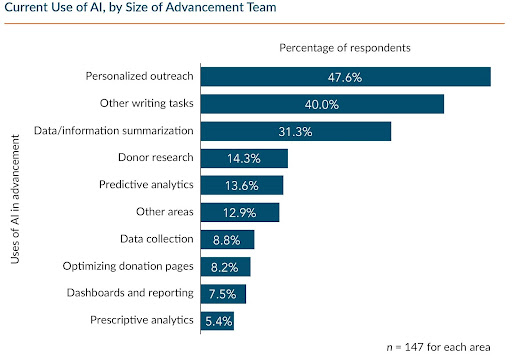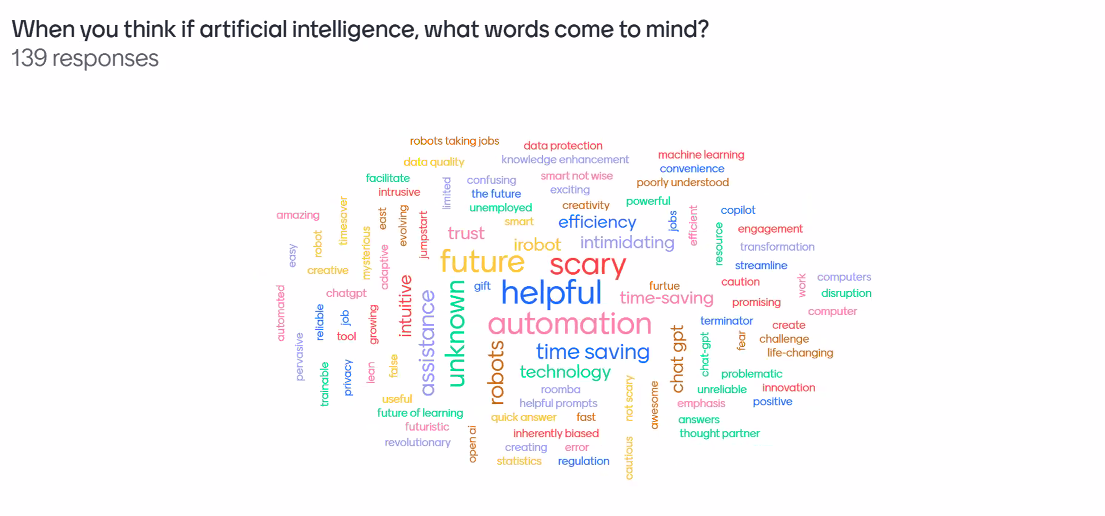“AI is not scary. It’s going to be your best friend.”
At least that’s what Josh Hirsch told attendees during a recent GiveCampus and CASE joint webinar on Artificial Intelligence (AI) in Advancement.
Hirsch is the Senior Strategist for Soukup Strategic Solutions. He is also the Digital Marketing Manager for, and a faculty member at, The Fund Raising School at Indiana University Lilly Family School of Philanthropy.
He elaborated on his AI-as-BFF premise, “I think that a better term [for AI] would be ‘overwhelming.’ AI is the most powerful tool we have available to us in fundraising in the past 30 years.”
Given that revelation, how are fundraisers currently leveraging this transformational technology and how might they apply it moving forward?
In November of 2023, GiveCampus partnered with the Council for Advancement and Support of Education (CASE) on a survey to better understand how Advancement professionals and their teams are approaching AI. The survey—the second in a series of joint surveys—covered topics ranging from ethical considerations and security concerns to AI’s overarching impact on advancement teams and their work.
Following the release of the survey report in March 2024, GiveCampus and CASE hosted a joint webinar to unpack the survey’s findings and dig deeper into how advancement professionals feel about AI. Below is a compilation of key takeaways from the survey results and highlights from commentary panelists provided throughout the webinar. You can access the full recorded webinar on the CASE website.
How Advancement Teams Are Using AI
AI has been a part of our daily lives for longer than many of us may realize—your Netflix subscription uses AI to surface recommendations for you and Google Maps is driven by AI. But, generative AI specifically began making waves in early 2023 for its potential to overhaul white-collar labor.
Jennn Schilling, Head of Product at GiveCampus, explained why generative AI has surged in popularity over the last year.
“The key with Gen AI is that this was the first major technological revolution that was democratized at warp speed,” said Schilling.”It took smart phones two years to get to 100 million users, but it took generative AI two months.”
AI has captured the curiosity of workers in every industry, including advancement professionals.. In fact, nearly 70% of survey respondents reported that they and/or their advancement team currently use AI. Interestingly enough, this impressive adoption curve seems to be largely driven by individuals rather than institutions. Schilling refers to these early adopters as “tinkerers.”
“These are people who are innately curious. They like to play around. Try new things. It won’t work this way, so they’ll try it that way,” explained Schilling. “They don’t like the status quo, and they always have their eyes peeled for new tools that could make them better or faster at whatever they’re trying to do.”
So, what processes and tasks are respondents trying to optimize with the help of AI?
Survey respondents use AI most commonly for personalized outreach and other writing tasks. Other popular use cases included data summarization and donor research.

This comes as no surprise to Schilling who noted that “Gen AI is really good at synthesizing, summarizing, and writing.”
In fact, Schilling’s team at GiveCampus built a free utility expressly for educational fundraisers that’s powered by generative AI. Using custom-built prompts, Donor Outreach AI assists advancement teams with common workflows—like drafting text message solicitations or writing targeted emails. Those custom-built prompts are what distinguish the GiveCampus offering from other off-the-shelf iterative AI tools.
Schilling’s team leveraged in-house fundraising expertise to train language learning models (LLMs) to think like a seasoned fundraiser. So Donor Outreach AI not only knows what LYBUNTs are, it knows how to message them in a way that resonates. By designing and refining prompts to elicit industry-specific responses from generative AI models, GiveCampus hopes to make AI more accessible and useful to advancement teams and frontline fundraisers—and efforts like this can help to accelerate adoption across institutions.
As fundraisers become more comfortable integrating AI into their workflows—and more AI-powered solutions are created with them in mind—we’ll see the use cases for AI begin to expand. Predictive analytics, for example, is one area of AI with a lot of potential to benefit fundraisers in their work.
How Advancement Professionals Feel About AI
Using AI is one thing, but how do fundraisers feel about AI? When asked to share the first thing that comes to mind when they hear the words “artificial intelligence” there were a range of answers.
One respondent had a similar optimistic outlook to Hirsch and Schilling.
“Having a smart copilot to support the work that needs to be done.”
Another respondent saw it as an inexcusable shortcut.
“Cheating. Getting out of the work of writing”

While there’s a spectrum of initial thoughts on AI, trust in the technology appears to be a factor affecting the adoption of AI in advancement. Regardless of whether they use the technology, only about 2.4% of respondents trust it completely.
Some of this uncertainty may stem from a lack of knowledge about AI and clarity around how respondents are permitted to use it in their work—only 13 percent of those surveyed received any kind of formal training on AI. Furthermore, the majority of respondents were either unaware of or unsure if institutional guidelines exist to help them make sound ethical decisions about the use of AI.
“It’s possible that the existence of guidelines helps drive adoption,” said Schilling. “If there are guidelines, there’s an increased sense of trust.”
Despite some hesitation, institutions continue to integrate AI into the workplace. And AI-powered tools are becoming more mainstream and ubiquitous every day.
“We are not at a need or a want stage. It’s really becoming a must-have,” said Hirsch. “Using AI we can reverse engineer anything we want. The speed and efficiency at which we can make our jobs easier, the more we can focus on important work like donor stewardship and donor retention.”
Schilling reiterated the importance of embracing AI, highlighting that this push to adopt AI is coming from the top down, too. “We’re hearing from board members and trustees that they’re expecting schools to use AI because many of them are coming from the private sector. They want to make sure the school that they are a part of is staying current and leveraging the latest tech.”
How GiveCampus is Shaping the Future of Philanthropy through AI
GiveCampus has already integrated AI into our platform to help fundraisers spend less time on tedious administrative tasks and more time building authentic relationships. While we see the potential of AI, we believe it should be leveraged to bring more humanity to fundraising—not less.
With this mission in mind, GiveCampus is using AI—including generative AI, machine learning, and natural language processing) to simplify common workflows and improve productivity for educational fundraisers. AI is at the forefront of our latest solution—GC Gift Officer—built specifically for major gift officers and their managers. From generating polished contact reports to producing personalized outreach en masse, GC Gift Officer leverages AI to save gift officers time so they can direct their attention to donor relationships.
We’re also excited to continue offering more AI-powered capabilities in our solutions and finding new ways to equip fundraisers with the tools they need to succeed. If you’d like to learn more about how GiveCampus can help you save time and work smarter, consider speaking with one of fundraising experts.



